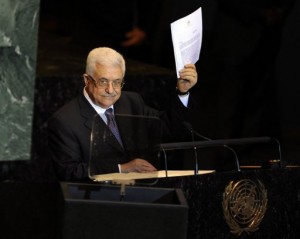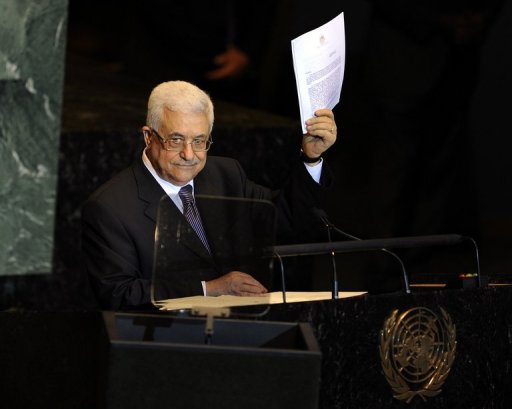 The vote in the United Nations General Assembly on the Palestinian application for non-member status is a foregone conclusion. They’re going to win and it’s not really going to matter much, at least in the short term. Nonetheless, the decidedly warped world of diplomacy around the Israel-Palestine conflict has managed to give us a small degree of drama around the bid, which is also illustrative of why there seems to be so little hope for change.
The vote in the United Nations General Assembly on the Palestinian application for non-member status is a foregone conclusion. They’re going to win and it’s not really going to matter much, at least in the short term. Nonetheless, the decidedly warped world of diplomacy around the Israel-Palestine conflict has managed to give us a small degree of drama around the bid, which is also illustrative of why there seems to be so little hope for change.
I posted a draft of the resolution on my blog earlier this month. You can see the final version here (pdf). There is simply nothing there that anyone with even the mildest interest in resolving the conflict could have the slightest objection to. This says a lot about where Israel and the US stand. No, the drama lies outside, with the Israeli-US-UK efforts to scuttle the initiative.
It’s been clear for quite some time that the Palestinian Liberation Organization (PLO) was not going to back down from bringing this resolution to the UNGA. At this stage, any threatening actions by Israel or the US could cause the PLO’s collapse, which Israel very much wants to avoid. So they had no way to stop the initiative from going forward and instead tried to change the substance of the resolution.
That, too, failed, but the changes they tried to make are instructive. Israel wanted to change or insert three conditions, none of which made any sense for the Palestinians. The US took the three conditions whole cloth and tried to convince the Palestinians to insert them. When that failed, it was passed off to the UK, who could offer the Palestinians something the US could not — namely, a yes vote on the UNGA resolution if they agreed to these conditions. Based on various reports, it seems that the Palestinians simply wanted to end the debate and went ahead and submitted the proposed resolution to forestall further discussion of it.
So, all the attempts at change seem to have failed. But the truth is that there is very little here for Israel to be worried about, at least for the time being. And this is why their reaction, as well as those of the US and UK, are all very telling. Let’s look at the three conditions Israel wanted to insert:
- 1. Israel wanted the resolution to state that the Palestinians would not seek membership in the International Criminal Court (ICC). Had the Palestinian Authority (PA) agreed to this, it would have sacrificed the one tangible benefit it gets from the General Assembly’s recognition of its non-member status. The other benefits are a matter of prestige and hopefully some diplomatic weight. But this is something the Palestinians can actually use at some point. Israel does not want to answer to the ICC, a court in which it is not a member, but whose decisions can make Israel more uncomfortable and give weight to protest movements, especially in Europe, where there is much more regard for international law than in the United States.
- Indeed, had the PA agreed to something like this, the reaction in the West Bank might have been as bad as if they had agreed to withdraw the resolution altogether. That issue only gets magnified in the wake of Hamas emerging from the latest Israeli bombing campaign in Gaza not only alive, but strengthened politically and with a ceasefire whose terms are surprisingly favorable to the government of Gaza.
- I strongly suspect that while the possibility of Palestine going to the ICC is probably the single most vexing aspect of this move in Israel’s eyes, they also probably knew that this was a non-starter, and perhaps didn’t even really want the PA to agree, as it might have spelled doom for the quisling Authority. In any case, it was a foregone conclusion that Palestinian President Mahmoud Abbas would refuse Israel’s condition.
- 2. Israel wants a clause stressing that this is a symbolic decision that grants no sovereignty over the West Bank, Gaza Strip or East Jerusalem. This was just an attempt at bullying. The UNGA resolution is, by definition, symbolic. It does not carry the weight of law, but merely expresses the view of the GA, as far as such weighty matters as sovereignty are concerned. Yes, specific statuses in the GA can allow the Palestinians access to certain international bodies, but there is no recognition of sovereignty here, nor could there be.
- Israel wants this kind of statement to blunt the impact of the resolution in the diplomatic field, but really it wouldn’t do much of that either. It was just a way to diminish the Palestinians’ claim on paper, and more than anything else, it was a lead-in to the one thing Israeli Prime Minister Benjamin Netanyahu really hoped to get out of this.
- 3. Israel wants any decision to include a Palestinian commitment to renewing direct negotiations with Israel without preconditions. This has become Netanyahu’s Holy Grail. He would love nothing more than the continuing sham “peace process” to drag on while settlements expand. But he also knows too much had already been discussed in the Oslo process, and fears, perhaps with some reason, that US President Barack Obama might eventually press for an endgame along the lines of the Clinton Parameters. Even if he doesn’t, Bibi doesn’t want to maintain the framework of withdrawal from more than 90% of the West Bank and some sort of sharing of East Jerusalem.
- For Netanyahu, “no preconditions” is a mantra, but one which means something very different than what the term implies. “No preconditions” means starting from absolute zero from the Palestinian point of view. It means no presumption that the 1967 borders are the starting point for discussion, or that there is any legitimate Palestinian claim to East Jerusalem. It means forgetting the Oslo Accords, other than perhaps the lines that Netanyahu wants to hold talks with the starting point at the facts on the ground. Those facts involve the settlements, including those in East Jerusalem that cut the city off from the rest of the West Bank and hemmed Bethlehem in, among other Palestinian towns. They include separation between the West Bank and Gaza and no presumption that they must be rejoined.
- Within that framework, any land Israel surrenders, any settlement or outpost Israel evacuates, is a “concession” to the Palestinians and more than that, a gift and symbol of Israeli largesse. Given not only Netanyahu’s right-wing orientation, but the even more radical rightward tilt of his party and, even more, his coalition, this is the only way he could sit and talk with the Palestinians, even if it is just for show. In other words, no preconditions means no to any Palestinian conditions at all and yes to plenty from the Israelis.
Ultimately, Israel knew it would have to tolerate this Palestinian move. It really couldn’t even respond to it without risking its West Bank subcontractor whose demise would mean that Israel would have to foot much more of the bill for its occupation. So, they tried to get the one thing they thought they had at least an outside shot at: talks without preconditions.
Israel’s failure to achieve that goal is not surprising. But the buy-in Netanyahu got from both the US and UK is something we should all be looking at. Abbas didn’t break off talks with Netanyahu on principle, or even because of settlement expansion itself. He broke them off because he knew that, after 17 years of negotiations in the shadow of expanding settlements, the clock had expired and the Palestinian people would no longer tolerate such a state of affairs. The peace process had been exposed as a sham to cover an entrenching occupation, and only a complete halt to settlement construction would allow Abbas to come back to the table without seriously risking the existence of the PA.
Maybe the US and UK knew that Abbas would not accept the “no preconditions” condition and that’s why they felt comfortable pressing for it. But I doubt it. Both countries simply want to see talks resume, fearing the stalemate and vacuum diplomatic silence produces while Hamas continues to establish itself as the more credible Palestinian leadership body.
And what choice do the US and UK have? The same choice they’ve always had, the same one that was always the only way this was ever going to be resolved: pressure both sides — but especially the powerful and comfortable one, Israel — to make the deal. (Pressure on Israel has been totally absent, while both the US and UK are quite practiced in pressuring the Palestinians). Remind them that the exports they both depend on, the cooperation they both need, will no longer be so forthcoming if they don’t achieve a lasting peace.
And, of course, that is an option that neither country is willing to take for no good reason other than domestic politics. This isn’t about forcing anything on anyone. Israel and the Palestinians are perfectly free to choose their own course, but if they choose one that is contrary to US or UK interests, those countries can also choose not to do business with them. This wouldn’t exactly cripple either nation, but domestic politics continue to rule the day, and the craven leaderships in both countries cannot even conceive of such actions.
– Mitchell Plitnick is the former Co-Director of Jewish Voice for Peace and former Director of the US Office of B’Tselem. You can follow him on Twitter at @MitchellPlit or at his blog, The Third Way.






I’m not sure what Israel was worried about, regarding sovereignty. surely the resolution which admitted Israel to FULL UN membership neither granted nor recognized Israeli sovereignty over any particular territory — because from 1948 onwards, Israel’s borders (with Lebanon and Syria and Palestine, have merely been the trucial lines of the cease-fire lines of 1950. Israel has de facto control over much territory but de jure sovereignty over none — or so I believe.
The Palestinians could do no better.